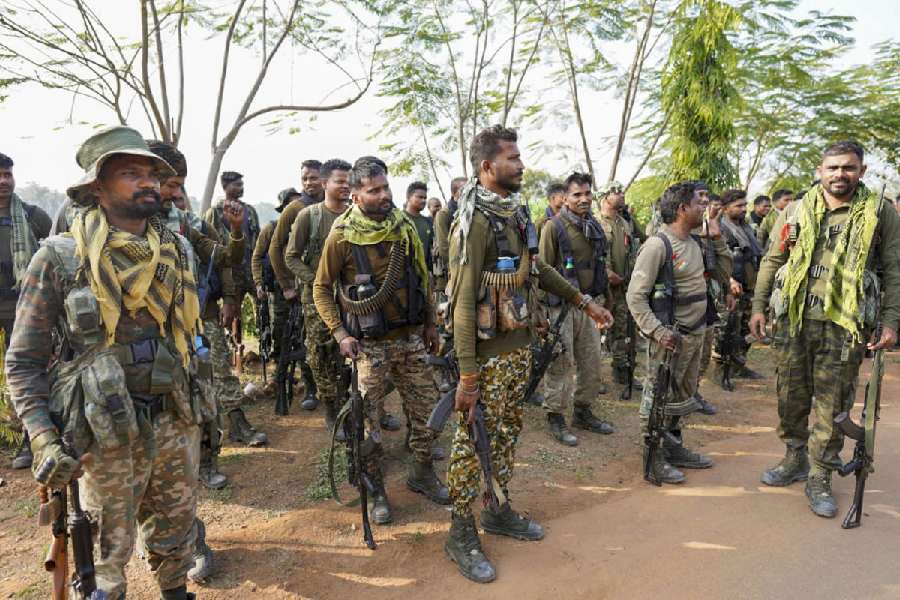 Wednesday, 22 January 2025
Wednesday, 22 January 2025
 Wednesday, 22 January 2025
Wednesday, 22 January 2025
When does a man deserve to die? That is the question reverberating across Bengal and beyond on Tuesday, a day after the court of additional sessions judge Anirban Das sentenced Sanjay Roy, a former Kolkata Police civic volunteer, to life in prison for the rape and murder of a postgraduate trainee doctor at RG Kar medical College and Hospital on August 9, 2024.
The judge in his order noted that the rape and murder of a young trainee doctor on duty at a state-run hospital shook the nation, and drew parallel with the bombing of Nagasaki in the dog days of World War II on the same date.
Yet, he refused to give Roy the maximum punishment – the death penalty.
The Bengal government moved swiftly, approaching the Calcutta high court against the sentence and demanding the death sentence for Roy less than 24 hours after the order.
Bengal chief minister Mamata Banerjee again expressed dismay over the order.
“If someone is so demonic and barbaric, then how can society remain humane? If someone is given life imprisonment, then the person can get freed on parole. I was once a lawyer and fought several cases. The Sealdah court judge said that it was not the rarest of rare cases. If this is not rarest of rare case, then what is it?" Mamata said at a public meeting in Malda on Tuesday.
Other lawyers, however, underlined that how the law sees it is not always how society sees a crime.
Nidha Patel, 36, a Noida-based criminal lawyer, said that the rape and murder of a doctor at a state-run hospital was serious, but the case did not exhibit the extreme level of cruelty or sadism often seen in cases classified as rarest of the rare, such as the the Delhi gang-rape of 2012.
“A case like Nirbhaya, where the victim was subjected to brutal violence and the public outcry was immense, would be considered rarest of the rare. While the act committed on a doctor is shocking, the broader societal impact might not be as profound as that seen in other cases of similar gravity. For example, mass sexual violence or heinous public assaults might be considered rarer.” Patel told The Telegraph Online.
In the RG Kar sentence, too, the judge had emphasised that the rule of law and judicial objectivity must prevail over public sentiment or emotional responses.
Suresh Chandrashekhar, a Bombay high court criminal lawyer, said factors such as brutality, age, provocation matter, as do past judicial guidelines.
“In India the criteria for rarest of rare crime denote that the crime must exhibit extreme cruelty, such as gruesome violence, multiple murders, or targeting vulnerable victims. Premeditated crimes or those committed with sadistic pleasure, without provocation, or with a callous disregard for life qualify as rarest of the rare. The offender’s background, criminal history, remorse, mental state, and potential for rehabilitation are taken into consideration before deciding,” Chandrashekhar said.
He also said the crime must shock the collective conscience of society. That is a criterion the RG Kar case – which has prompted protests unprecedented even in a city like Kolkata that is known for its protests – fulfills.
Ajay Kumar, a criminal lawyer from Bangalore, felt there were perhaps other mitigating factors.
“The turning factor in this case may be the difference between the depravity and conduct anti-mortem and post-mortem. Whether the evidence was conclusive or circumstantial would have weighed on the mind of the sessions judge. According to me it is not the rarest of rare cases,” Kumar said.
“A crime to be called rarest of rare must be of a level of depravity that exceeds ordinary levels. Depraved acts like this happen all the time in India. This crime got a lot of attention. When viewed in context of other crimes where the death penalty has been awarded, this crime is a rape and murder by strangulation,” he added.
Harshit Jain, a Delhi high court criminal lawyer, said factors such as lack of premeditation, potential provocation, or the possibility of reform for the convict may have played a role in the sentence.
“The Supreme Court in Bachan Singh vs State of Punjab (1980) laid down the principle that the death penalty should be awarded only in cases where the alternative of life imprisonment is unquestionably inadequate,” Jain pointed out.
“The Supreme Court in Bachan Singh vs State of Punjab (1980) laid down the principle that the death penalty should be awarded only in cases where the alternative of life imprisonment is unquestionably inadequate,” Jain pointed out.
The RG Kar judgment referred to the Bachan Singh case.
“Courts often consider the possibility of reform,” Jain said. “There may be an argument that the accused has the potential for rehabilitation, making life imprisonment a more suitable punishment. In Santosh Kumar Bariyar vs. State of Maharashtra (2009), the Supreme Court emphasised restraint in awarding death penalties and stressed that the doctrine must be applied sparingly.”







